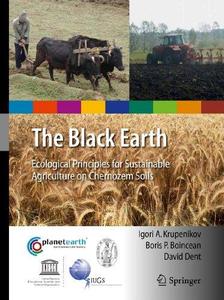
Free Download The Black Earth: Ecological Principles for Sustainable Agriculture on Chernozem Soils By David Dent, Boris P. Boincean, Igori Arcadie Krupenikov (auth.)
2011 | 146 Pages | ISBN: 9400701586 | PDF | 8 MB
Soil is the Earth's living skin. It provides anchorage for roots, holds water long enough for plants to make use of it and the nutrients that sustain life - otherwise the Earth would be as barren as Mars. It is home to myriad micro-organisms and armies of microscopic animals as well as the familiar earthworm that accomplish biochemical transformations from fixing atmospheric nitrogen to recycling wastes; it receives and process all fresh water, provides the foundations for our built environment; and comprises the biggest global carbon store that we know how to manage. This book is about the best soil in the world - the black earth or chernozem: how it is being degraded by farming and how it may be farmed sustainably. Industrialisation of farming has laid bare contradictions between the unforgiving laws of ecology and economics. Soil organic matter is the fuel that powers soil systems and the cement that holds the soil together - and in place - but agriculture is burning it up faster than it is being formed: even the chernozem cannot long survive this treatment. Here is the evidence for this trend and, based on long-term field experiments, ecological principles for sustainable agriculture that can reverse the trend and, at the same time, feed the world. Unlike other volumes in the series, this is not an edited collection of scientific papers. The authors have chosen the classical monograph to be near to the reader from beginning to end - to convey their anxiety about the state of the land and their optimism about the possibility of retrieving the situation by changing the social and political approach to the land so as to provide the necessary incentives for sustainable land use and management. About the authorsIgori Krupenikov is soil scientist, Emeritus Professor, honoured member of the Moldovan Academy of Sciences and State Laureate, working at the Nicolai Dimo Institute of Soil Science and Agrochemistry in Chisinau. Boris Boincean is agronomist, long-time Director and continuing Head of the Department of Sustainable Farming Systems of the Selectia Research Institute for Field Crops and also Professor at the Aleco Russo State University at Balti, in Moldova. David Dent is former Director of ISRIC - World Soil Information in Wageningen, awarded the Australian Centenary Medallion for scientific leadership of the National Action Plan for Salinity and Water Quality, and long-time teacher and researcher at the School of Environmental Sciences, University of East Anglia.
